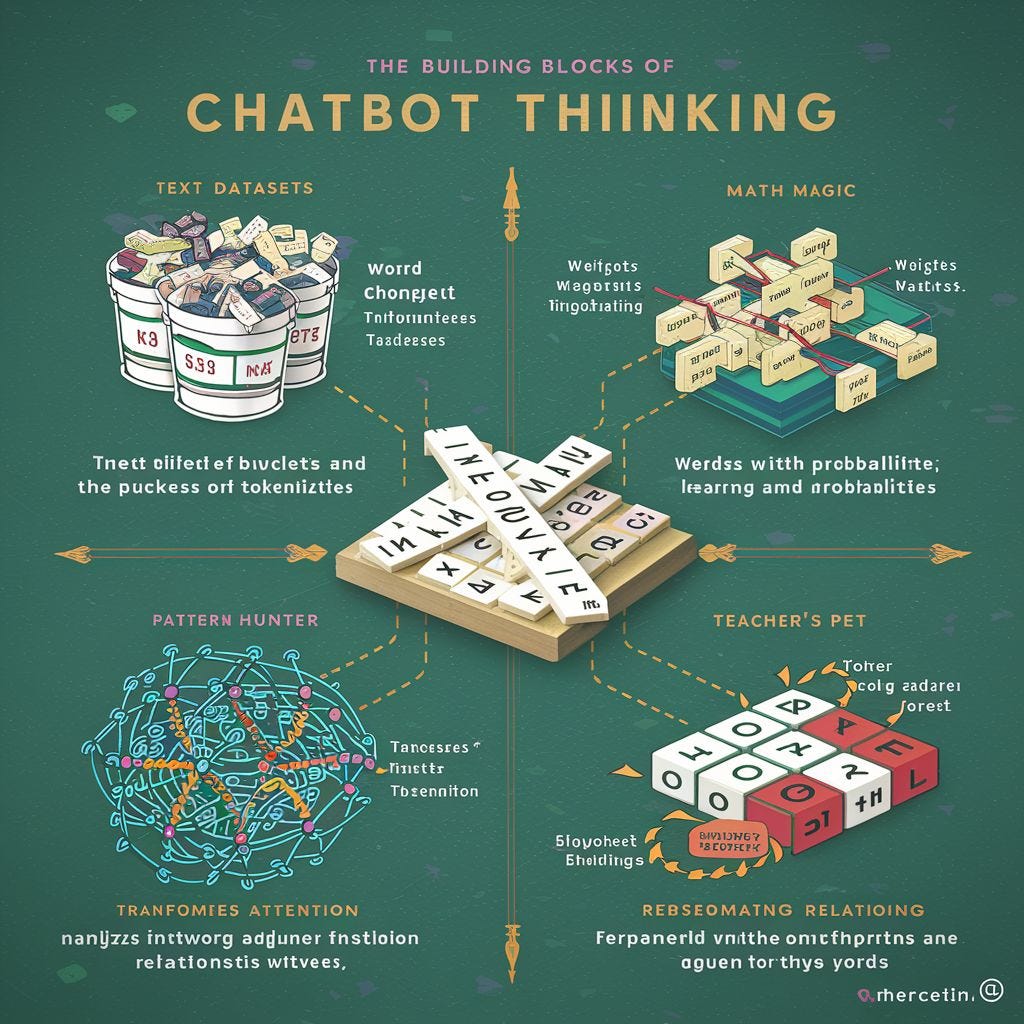Let's be honest – chatbots don't really understand.
Yes, tools like ChatGPT are amazing. They can hold conversations, write poems, and seem darn near human sometimes. But beneath the surface, even the most advanced AI language models are not thinking beings. It's a lot more like...playing the world's most intricate word association game.
Don't get me wrong, it's incredibly sophisticated. But words don't equal genuine comprehension. So, how does it work?
The Building Blocks of "Chatbot Thinking"
Let's break it down in a way that even folks who dread tech jargon can appreciate:
Word Chopping (Tokenization): Imagine those giant datasets of text that AIs train on as huge buckets of Scrabble tiles. Tokenization is like breaking sentences down into individual tiles – words, parts of words, even punctuation. It helps the AI handle language efficiently.
Math Magic (Weights and Probabilities): Think of each of those word tiles as having a little number attached – a "weight". This number is constantly adjusted by the AI as it learns. It helps the AI figure out which words seem likely to go together and creates realistic-sounding text.
Pattern Hunters (Transformers and Attention): This is where things get really cool. Transformers allow the AI to analyze all the words at once, finding relationships between them. That's why chatbots can keep track of a conversation better than older models.
Teacher's Pet (Reinforcement Learning): AI gets better over time through feedback – both automated and from humans. It's like a massive game of "hotter" or "colder" with words, allowing the AI to refine its output, so it sounds even more natural.
Why You Should Care
Seems kinda geeky right? But understanding even the basics helps us be smarter users of AI and cut through the hype. It explains why:
AI's Hallucinations: A Growing Concern
The phrase "chatbots hallucinate" highlights a unique characteristic of large language models (LLMs) – their tendency to fabricate information to fill gaps in knowledge or understanding. It's important to understand that they don't do this out of malice; rather, it arises from the way these models are trained. This propensity to generate falsehoods has ignited significant concern and pushback against AI adoption. After all, who will bear responsibility if these AI-generated falsehoods cause harm, or even prove fatal?
The media's focus on AI's potential dangers further fuels these worries. Schools, acutely aware of parents' exposure to the news, naturally share these safety concerns. It's a complex, multifaceted fear.
Understanding AI's Limitations
Crucially, AI systems are not search engines. They don't sift through real-time information for answers. Instead, they rely on massive datasets used during training. This reliance can produce outdated results, infused with bias from the training data, or simply incorrect. Even if you instruct an AI to search the web, it might blend those results with information from its training data, potentially blurring the lines of accuracy. For educators, this makes citing sources and verifying AI-generated information a non-negotiable practice. The strength of true knowledge and critical thinking will always be paramount, even as AI becomes more sophisticated.
The Copyright Conundrum
Finally, AI's reliance on vast troves of human-created content raises ethical dilemmas around copyright and intellectual property. We've entered a murky legal and moral territory as AI systems learn from and potentially reproduce the work of countless artists, writers, and programmers.
Thinking Like an AI – Your Challenge
Want to get AI in your bones? Here's a fun exercise:
Pick an everyday object: A mug, a phone, a stapler – the more mundane, the better.
Become the "AI": Describe that object using only the type of language patterns an AI model picks up on (think keywords, common phrases, maybe some nonsensical bits).
Share it with a friend: See if they can guess the object! Get them thinking about how AIs "see" the world.
Want to get ahead of the AI curve? Subscribe now! Each week, you'll get a breakdown of the AI tools, trends, and ethical debates that matter to busy educators, business leaders, and the generally curious.
#AImastery #EdTechTrends #CriticalThinking #FutureOfWork #ResponsibleTech


